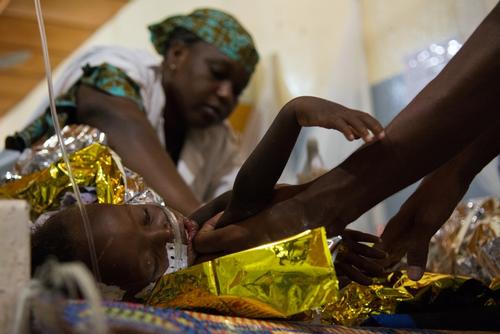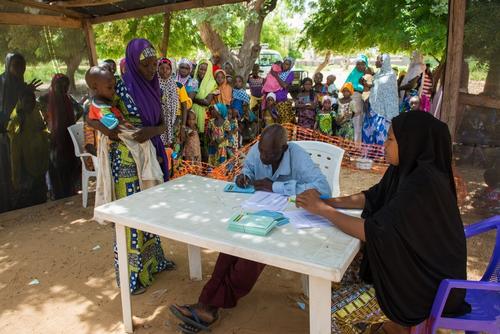In Niger, after a significant decline in malaria cases over the last three years, there has been a resurgence of the disease in the areas where MSF works. This has called into question prevention efforts implemented since the last malaria peak in 2012.
"The number of admissions this year has been exceptional, even compared to 2012," says Hamsatou Seydou Abdou, an MSF nurse at the inpatient therapeutic feeding centre (ITFC) at Madaoua hospital. In Madaoua health district, Tahoua, the medical authorities recorded 6,695 malaria cases in the second week of October compared to 3,901 cases during the same period in 2015. MSF teams have responded to the emergency by setting up additional health structures and recruiting temporary medical staff in the Tahoua, Zinder, Maradi and Diffa regions. Approximately 60,000 children have been treated so far. In addition to the peak in malaria transmission there is also an annual increase in cases of acute malnutrition during the hunger gap, which coincides with the rainy season.
The causes of this resurgence of malaria, and the measures that can be adopted to fight it, need to be examined. Following the 2012 peak, several measures to combat malaria were adopted by the health authorities, with the support of MSF. These included the distribution of mosquito nets treated with insecticide, the implementation of a chemoprevention programme, and epidemiological monitoring of cases. Thanks to these measures, in 2014 the number of people with malaria dropped by more than 70 per cent. However, cases started to reappear little by little until they had more than doubled in 2016 during the same period.
"Mortality rates in the ITFC have decreased from 16 per cent in 2012 to 6.1 per cent in 2016. This decrease indicates progress, which can be attributed both to the prevention campaign and also to the continuous improvement in the quality of care," explains Dr Carol, MSF medical coordinator in Niger. "There is no doubt though that prevention efforts must be continued. It is currently too soon to explain the specific reasons for this resurgence of malaria. At present we can only put forward hypotheses and propose action plans accordingly."

Prophylaxis for seasonal malaria prevention consists of administering treatment to children aged between three months and five years years during the four peak months, when the incidence of the disease is at its highest. In the Magaria and Dungass districts, 109,390 children have benefited from this programme, representing 93.4 per cent of the population in this age group in the targeted areas. In 2016, organisational problems and a lack of means have affected the effectiveness of the prevention campaign. For example, there was a shortage of rapid diagnostic tests at some health centres between the months of June and August, at the height of the peak period.
Correct treatment administration is also a critical factor inits success. This year, Epicentre, MSF’s centre for epidemiological research, conducted a study at six centres in Magaria district, in the Zinder region, to assess the protective efficacy of a seasonal malaria chemoprevention programme implemented in the field.
"Perhaps there was some slackening after the success of the first prevention campaigns, but there are many factors that can cause an unexpected increase in transmission," says Dr Carol. "We're also in the process of assessing the impact of the rains which, as well as arriving earlier than usual this year, have been very heavy, and this has encouraged the spread of malaria. We also can't rule out the possibility that a resistance to the pharmacological treatment used for the chemoprevention has developed. MSF is conducting some studies with Epicentre on this topic."
Further south, in the Maradi region, MSF teams have confirmed an influx of patients from Nigeria. "In September, up to 52 per cent of our patients came from Nigeria," explains Felix Kouassi, MSF's head of mission in Niger. "People cross the border to come to the centres where MSF works and where the healthcare is free. But this poses a serious problem for the effectiveness of our prevention programme, which is only reaching 50 per cent of the target population. This situation is leading us to consider the need to carry out malaria prevention activities beyond Niger's border."



